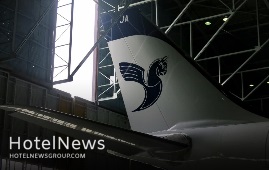
Iran’s flag carrier IranAir is set to resume flights to and from Pakistan and France after weeks of suspension imposed to curb the spread of a novel coronavirus variant into the Islamic Republic. The Civil Aviation Organization of Iran (CAOI) allowed air travel to and from Pakistan and France after dropping the two countries from the red list due to the coronavirus pandemic. CAOI Spokesman Mohammad Hassan Zibakhsh said that flights to and from Islamabad and Paris had been resumed on Tuesday after a two-month suspension, Fars reported on Sunday. “However, Iran will continue to enforce a tough ban on flights to 13 countries where the highly-infectious British variant of the coronavirus has not been fully contained,” Zibakhsh explained. The official said Pakistan and France will remain among the 26 countries which still have a high rate of infection to the virus, adding that flights to those countries will continue with restrictions.
Create: Jun 20, 2021 Edit: Jun 21, 2021 Regional News
A select of Iranian travel-associated businesses and tour operators will promote handicrafts, traditions, and tourism potentials of the country at the 42nd FITUR tourism trade fair, which will be held in Madrid, Spain, from January 19 to 23, 2022. The Touring & Automobile Club of the Islamic Republic of Iran (TACI) as the representative of the Ministry of Cultural Heritage, Tourism and Handicrafts will be organizing Iran paravian at the tourism trade show, Mehr reported. A variety of exhibits, live performances, meetings, and workshops are amongst lineups of the Iranian exhibitors at FITUR 2022, which connects the industry with the inbound and outbound international markets. After hosting a post-pandemic recovery edition in the Spring of 2021, FITUR Madrid 2022 will resume its regular appointments at the beginning of the year, taking place at IFEMA – Feria de Madrid. Over the five days of the international tourism fair, professional participants will have access to unmissable commercial and business activities. In addition to being able to present their offers directly to the end customer, exhibitors can meet with over 150,000 trade visitors with significant purchasing power, according to organizers.
Create: Jun 19, 2021 Edit: Jun 19, 2021 Regional News
A British Airways plane crashed on Friday at Heathrow Airport in the United Kingdom. The front of the plane fell. Due to which a large number of passengers had to wait for the flight to take off. British Airways plane crashed According to a report published in The Sun, at present, there are many vehicles for emergency service near the crashed plane at the airport. On receiving the news of the incident, the fire engine, ambulance and police team immediately reached the spot. However, the extent of the damage caused in this accident is yet to be assessed. The front of the plane fell to the ground The plane that fell victim to the accident is a Boeing 787. It can be clearly seen in the picture that as if the front part of the plane is kept on the ground. British Airways spokesperson A British Airways spokesman said part of a plane suddenly collapsed. It is good that there was no passenger in the plane at the time of the accident. The safety of passengers is our first priority. We are probing the matter. The crashed plane took off from Moscow, Russia, and reached London’s Hetrow Airport on June 16. The accident happened at the airport on Friday morning.
Create: Jun 19, 2021 Edit: Jun 19, 2021 International News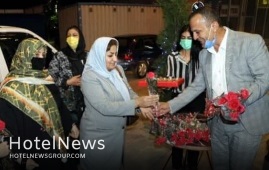
After more than a year of closure following the outbreak of coronavirus, Iran and Turkey have reopened a land border to passengers, ISNA reported on Friday. The Kapikoy-Razi border reopened on May 17 and a group of 41 female Iranian entrepreneurs and artists has recently entered the city of Van in Turkey, where the city’s hoteliers welcomed them with flowers, the report said. Tourists and vehicles are allowed through the border with negative COVID-19 PCR test results issued 72 hours in advance of entry. However, Razi-Kapikoy border from the Iranian side is still closed to tourists, and only diplomats, businessmen, and people who have a residence permit or are studying and living in Turkey are allowed to cross. As Turkey is a country through which many trips of Iranians living abroad and foreign nationals to Iran are made, the coronavirus pandemic prevented several businessmen and students from continuing their activities and even left patients who want to go abroad for further treatment helpless. Some 1.37 million Iranian tourists visited Turkey during the first eight months of 2019, accounting for 4.4% of all international arrivals in the country.
Create: Jun 12, 2021 Edit: Jun 12, 2021 Regional News
HNI, [۲۶.۰۵.۲۱ ۱۱:۴۱]Hotel technology exists to amplify, not burden, a hotel’s guest experience. Truly guest-centric technology should empower hoteliers to deliver their unique and ideal version of the guest experience. But great hotel technology should not only be guest-focused, it must also be management-focused, by helping hotels scale their business, and staff focused by facilitating operations, streamlining communications, and promoting employee productivity. In the face of a post-pandemic labor crunch, hotels need a mobile and guest-centric PMS to support a lean staff as they look to meet an uptick in travel demand. 2021 Will See the Hospitality Industry Roaring Back… But Hiring Still Lags BehindThe COVID-19 pandemic was devastating for hospitality, setting the industry back over 10 years in terms of occupancy and job losses. According to the ALHA, the pandemic cost the U.S. hospitality industry over 50% occupancy, and over 3.1 million jobs. The good news, however, is that the industry is on the verge of a major recovery. Rising vaccination rates, coupled with rapidly falling case numbers have led to an increase in confidence with the traveling public. According to Destination Analysts,confidence in travel safety is increasing, with over 61.8% of American respondents confident that the pandemic situation will continue to improve, and over 72% of the respondents making travel plans in the previous week. This rising optimism is being seen in job reports indicating that the hospitality sector gained over 331,000 jobs in April 2021 一 the sixth largest gain in the past 50 years. Unfortunately, these gains may not be enough. U.S. hotels are still 600,000 workers short of pre-pandemic levels, but workers don’t seem to be filling the vacancies. This can be attributed to a number of factors, including widespread health concerns, difficulty obtaining childcare, and the recent rise in federal unemployment benefits. The question for hotels is how can they leverage technology to support a lean staff, get new staff up to speed quickly, and help their current employees better engage with and serve their guests, without the burden of physical or technological constraints. PMS Technology Should be Intuitive, Mobile, and Unburden StaffHoteliers joined the hospitality industry because they delight in serving their guests 一 not because they wanted to fight with outdated technology. If hotels want to retain high-performing employees, they should invest in technology that actively empowers them to deliver an exceptional guest experience. What does it mean to have a staff-focused PMS? On the most basic level, PMS platforms should be intuitive and easy to use, and never burden employees when serving their guests. When technology is delivered through an intuitive user interface, hoteliers can spend less time buried in their screens, and more time actively engaging with their guests. Additionally, mobile & guest-centric PMS technology should promote maximum ease of access. Hoteliers should be able to manage their property from any location and device, giving them the freedom to move about the hotel and meet guests wherever they are. This allows staff to have more natural and personalized interactions with their guests, while also freeing any staff member, no matter their specific job title, to help any guest in any section of the hotel. Easy-to-Train On Systems Enable Hotels to Expand their Talent PoolPMS platforms should be easy to train on and easy to master. When technology is easier to understand, hotels can hire staff based on how they actually interact with guests 一 not how well they “get” outdated technology. When a new staff member is hired, it should be easier to train and onboard them to the new technology, thereby increasing adoption throughout your team. HNI, [۲۶.۰۵.۲۱ ۱۱:۴۱]When investing in new PMS technology, hoteliers should also explore what resources the vendor offers in terms of staff training and support. The right PMS technology vendor will view its relationship with its clients as a long-term strategic partnership, and will make sure its clients’ staff have the resources they need to get the most out of their product. Look for a dedicated implementation team, with the option for either in-person or remote implementation, as well as a dedicated client success manager (CSM), who can act as the customer’s voice within the organization. The right PMS vendor will provide robust self-training resources, including a comprehensive product knowledge base, on-demand e-learning courses, and best practice materials which demonstrate how to use the product to enhance the guest journey and operational efficiencies. Mobile Communication Can Streamline Operations and Improve Staff MoraleBreakdowns in team communication can easily lead to breakdowns in team morale. When hoteliers communicate with walkie-talkies and landline telephones, critical information can get lost in the shuffle, resulting in dissatisfied guests and frayed team dynamics. A mobile, guest-centric PMS can streamline staff and guest communications in a number of ways: Instant room updates automatically notify front desk staff when a room is ready or out of order, while analytic dashboards can keep your entire staff updated on key performance metrics. For more sophisticated forms of communication, native-cloud PMS systems can integrate with third-party guest messenger platforms. Guest messaging delivers seamless communication throughout the guest journey using common messaging platforms such as SMS, Facebook Messenger or WeChat. This allows guests to communicate instantly with staff through their mobile device, while also allowing staff members to serve multiple guests through multiple chat windows. Use Advanced Automation to Get the Most Out of a Limited Staf The hospitality industry is facing increased travel demand and heightened expectations for cleanliness and service, as it moves into the peak 2021 summer travel season. Unfortunately, they are still hampered by limitations in resources and staff size. By incorporating robust automation, a mobile PMS can help hotels get the most out of limited staff, while also freeing hoteliers from many of the mundane, repetitive tasks that take them away from their guests. A native-cloud PMS can automate simple but repetitive tasks such as room assignment, bulk check-in, and housekeeping task management. But it can also automate more advanced processes 一 like the entire check-in experience. Guests can have the option of checking in through their mobile device or a guest-facing smart kiosk. Mobile self check-in can not only streamline and personalize the check-in experience for guests, it can free hotel staff from engaging in repetitive and scripted dialogues during the check-in process. This self check-in option can also include automated targeted offers for amenities and room upgrades, giving the hotel an additional stream of ancillary revenue. Instead, they can focus on more natural and personalized interactions, like answering questions about dining options, or greeting guests with tea or champagne in the lobby. Great Technology Should Empower Great HoteliersIn order to succeed in the post-pandemic hospitality market, hotels have to deliver exceptional and personalized service on a limited staff. Therefore, it’s crucial that they invest in technology which is not only guest-centric but staff-centric as well. A mobile, guest-centric PMS delivers on both of these goals, by leveraging a system that is easy to use and easy to learn, while facilitating both staff communication and streamlined operations. Great technology should empower both hoteliers and their employees to deliver the best guest experience possible. And a guest-centric PMS can help them do just that.
Create: May 26, 2021 Edit: May 26, 2021 Hotel Management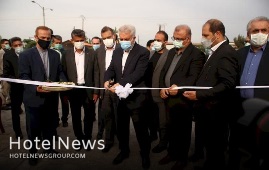
Cultural Heritage, Tourism and Handicrafts Minister Ali-Asghar Mounesan on Monday inaugurated a traditional restaurant during his visit to Sari, the capital of the northern Mazandaran province. Constructed in a piece of land covering 834 square meters in area, the traditional restaurant is expected to generate 18 job opportunities, CHTN reported. The minister was scheduled to inaugurate 78 tourism-related projects -- virtually or in-person -- during his two-day visit to the northern province, the report added. Last year, Iran joined an online campaign launched by the World Tourism Organization (UNWTO) to promote gastronomy as an essential part of tourism. Experts say that food is not merely an organic product with biochemical compositions. For members of each community, food is defined as a cultural element. The Iranian cuisine, usually embellished with fragrant herbs, varies from region to region, however, it principally accentuates freshness, deliciousness, and colorfulness. Dizi (a lamb, chickpea, and potato stew made to a centuries-old recipe), fesenjoon (chicken poached in an earthy sweet-and-sour sauce of ground walnuts and pomegranates) are amongst the most popular traditional dishes of the country. Traditional Iranian dishes are usually not overpowered with spices though kitchens are embraced with ranges of subtle and yet contrasting flavors such as a combination of sweet and sour or mild. Stretched along the Caspian Sea and Alborz mountain range, Mazandaran is a popular destination for domestic holidaymakers and it is home to more than 3500 villages and rural areas.
Create: May 26, 2021 Edit: May 26, 2021 Regional News
Various collections of the Iranian postage stamps issued since the Qajar era (1789–1925) onwards have been put on show at a newly-established museum in the historical city of Tabriz, the capital of East Azarbaijan province. Setting up inside the 200-year-old mansion (locally named “Khaneh Mojtahediha”), the museum was officially inaugurated on Saturday during a ceremony attended by Ramezanali Sobhanifar, the managing director of the National Post Company, and several local officials, IRNA reported. Furthermore, the museum turns the spotlight on the progress of communication and information technology tools in the country, showcasing numerous items from horse-drawn carts, scales, post boxes, as well as antique telephones and radios. Iran is one of the world’s pioneers in rendering postal services which dates from about 2,500 years ago. The modern post was launched more than one-hundred and fifty years ago by Amir Kabir, who was chief minister to Naser al-Din Shah Qajar. The historical city of Tabriz became the capital of the Mongol Il-Khan Mahmud Gazan (1295–1304) and his successor. Timur (Tamerlane), a Turkic conqueror, took it in 1392. Some decades later the Kara Koyunlu Turkmen made it their capital, it was when the famous Blue Mosque was built in Tabriz. The city retained its administrative status under the Safavid dynasty until 1548 when Shah Tahmasp I relocated his capital westward to Qazvin. During the next two centuries, Tabriz changed hands several times between Persia and Ottoman Empire. During World War I, the city was temporarily occupied by Turkish and then Soviet troops.
Create: May 24, 2021 Edit: May 24, 2021 Regional News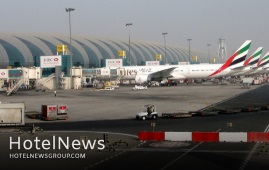
Dubai International Airport maintained its position as the largest airport in the world in terms of the number of international travelers, during the year 2020, for the seventh year in a row, according to the annual report of the International Airports Council, which monitors the performance of the air transport sector in the world. "Airports Council": in terms of the number of international travelers ... for the seventh year in a row Dubai International is the largest airport in the world in 2020 Dubai International Airport maintained its position as the largest airport in the world in terms of the number of international travelers, during the year 2020, for the seventh year in a row, according to the annual report of the Airports Council International, which monitors the performance of the air transport sector in the world. Council data, of which Emirates Today obtained a copy, showed that Dubai International Airport handled about 25.9 million international passengers last year, while the annual air freight volume in 2020 reached 1 million 932 thousand and 22 tons. Arrangement According to the data, Amsterdam Airport ranked second with 20.8 million passengers, a difference of more than five million passengers, compared to Dubai International Airport, which came in the forefront, while London Heathrow Airport fell to third place, recording 20.6 million passengers, while it ranked Paris airport ranked fourth with 19 million international passengers, while Frankfurt Airport came in fifth place with 16.8 million passengers. Passenger traffic The International Airports Council revealed that global passenger traffic in the 10 busiest airports in the world decreased by 45.7% over the past year, indicating that, in general, passenger traffic at the world's airports decreased by 64.6%, indicating the impact of the "Covid-19" pandemic. He explained that the impact of the pandemic led to a virtual halt of aviation in 2020, as the published data reveal the challenge that airports still face, stressing that it is still necessary to support the aviation industry through direct support to ensure aviation's ability to cope, rebuild connectivity and feed the global economic recovery. Recover The Council indicated that with some positive signs of recovery, especially in countries with high vaccination rates, a sustainable global recovery will only be achieved through the escalation of vaccination campaigns, the continuous development of digital health corridors, and the coordinated and coherent policy support of governments. Air shipments The Airports Council pointed out that air cargo was less affected by the pandemic, with volumes dropping by only 8.9%, to an estimated 109 million metric tons in 2020, equivalent to 2016 levels (110 million metric tons). He mentioned that airport operators also continue to work closely with their airline partners and other stakeholders to balance the current market realities and the cost of providing infrastructure while overcoming the crisis together. • Dubai Airport handled 25.9 million international passengers last year. • 1.9 million tons of air freight volume through "Dubai International" in 2020.
Create: May 16, 2021 Edit: May 16, 2021 International News
Element Hotels – part of Marriott Bonvoy’s extraordinary portfolio of 30 leading brands and designed for today’s healthy, active traveler – announce today the opening of Element Philadelphia, marking the brand’s debut in the city. Developed by Conshohoken-based Chestlen Development, the hotel will be the newest addition to Philadelphia’s reemerging hospitality scene, with travelers planning an average of 2.7 trips this year, according to a recent Visit Philadelphia report. Designed with a focus on sustainability and well-being, Element is ideal for families, groups and business travelers who want to maintain a balanced lifestyle while on the road. “Bringing the Element brand to Philadelphia was a strategic decision to appeal to the wellness-minded modern traveler, who is looking for self-sufficiency, more space to recharge, and amenities that align with their lifestyle,” stated Edward Baten, Complex General Manager, Element Philadelphia. “As the needs of travel, work and leisure have evolved over the last year, our offering is better suited than ever before to welcome guests with a range of work and life demands. Our flexible accommodations will open at a time when it’s needed most for leisure and business travelers alike.” Element Hotels has redefined the longer stay experience with a design philosophy that encourages guests to recharge and find focus. This approach is seen throughout Element Philadelphia, the brand’s largest property globally. The hotel’s 460 bright and modern guest rooms are positioned in an ideal Center City location and boast impressive views of Philadelphia’s historic architecture and skyline. The sunlit Sky Lobby will offer open seating for work and relaxation, and a range of safe, socially distanced amenities for guests to utilize. Fully equipped kitchens in every room, a business center, Motion Fitness center and guest laundry services create flexible work-from-anywhere possibilities. At Element Philadelphia, guests will be energized with a food and beverage program that prioritizes fresh, healthy ingredients. A complimentary Rise breakfast starts the day and the Relax evening reception invites guests to unwind together in the Sky Lobby. Balanced grab-and-go meals, snacks and beverages are available from the Restore gourmet pantry, which features products from local producers. In addition, guests are invited to eat well from the comfort of their own room. With kitchens stocked with everything needed to create a home-cooked meal, Element hopes to inspire guests by introducing local culinary and nutritional voices to provide easy-to-follow recipes. These digital recipes and meal ideas, which will be accessible via in-room QR codes and in pre-arrival emails, will feature fresh, local ingredients that can be picked up at iconic neighborhood markets such as Di Bruno Brothers and Reading Terminal Market. Designed to get visitors moving, Element Philadelphia features a Bikes to Borrow program with its custom-designed Priority Bicycles in unmistakable Element green. The Bikes to Borrow program provides suggested routes to help guests experience the city’s history, art or nearby bike trails. Whether on two wheels or walking with a four-legged friend, Element encourages guests and their pets to explore more. Element’s pet-friendly program includes a signature dog bed, treats, water bowls, eco-friendly clean-up supplies and more for travelers visiting with pets. Element Philadelphia offers more space for guests to live their lives in rooms ranging in size from a Standard guest room, to Deluxe and Executive guest rooms, to One Bedroom Suites. The signature Westin Heavenly® beds and spa-inspired bathrooms feature rain showers designed to infuse a sense of calm. Element is proud to be green from the ground up and has built a smarter, better place to stay. When choosing materials, Element Philadelphia’s design team pioneered eco-friendly, sustainable design that improves hotel air quality, minimizes pollutants and chemicals, and gives guests ample access to natural light, resulting in a cleaner, healthier environment. The hotel also integrates eco-friendly materials and practices into its design in a variety of ways, including: Electric vehicle charging stations Guestrooms featuring carpets with up to 100% recycled content Wall art mounted on a base made from recycled tires Walls featuring low-VOC (volatile organic compounds) paints Bathrooms featuring low-flow faucets and fixtures Silverware and glassware provided, minimizing single-use plastics and disposable waste Recycling is made easy with bins in every guestroom and throughout public spaces Filtered water is available in all guestrooms and in the public spaces through a dispenser unit Element Philadelphia uses only 100% recycled postconsumer wastepaper for all printing and stationery needs Element Philadelphia will soon provide access to over 45,000 square feet of purpose-built event space, fully adaptable for the changing dynamics of indoor meetings, events and celebrations. Guests of Element Philadelphia can travel with confidence with services adapted for COVID-19, adhering to Marriott’s Commitment to Clean standards throughout their stay, including contactless check-in, social distancing, increased cleanliness protocols and new UV-light cleaning technologies. Consisting of in-house and outside experts in food safety, hygiene and infection prevention, and hotel operations, the Marriott Cleanliness Council has redefined cleaning and safety standards.
Create: May 16, 2021 Edit: May 16, 2021 International News
Blue Origin announced May 5 that it will fly people on its New Shepard suborbital vehicle for the first time July 20, and will auction off one of the seats on that launch. The company said that, after years of test flights without anyone on board, it will start flying people on New Shepard. The announcement took place 60 years to the day after the vehicle’s namesake, Alan Shepard, became the first American space on the suborbital Mercury 3 launch. The scheduled date of the flight is the 52nd anniversary of the Apollo 11 landing. The company hinted during its most recent test flight of the vehicle April 14 that it was ready to start flying people on the vehicle. The company used the flight to test procedures for future crew flights, including having company personnel, playing the role of customers, boarding the vehicle during prelaunch preparations, and also practicing exiting the vehicle after landing. “We have flown this vehicle 15 times and, after the last flight, we said, ‘It’s time. Let’s put people on board,’” said Ariane Cornell, director of astronaut sales at Blue Origin, in a call with reporters. The company did not disclose who would fly on the vehicle, capable of carrying six people, beyond that it will make one seat available to the public via an auction. The company will accept sealed bids through May 19, then go into an unsealed bidding phase, concluding in a live auction June 12. Blue Origin said the proceeds of the auction will go to an affiliated nonprofit organization, the Club for the Future, that supports STEM education activities. When Blue Origin announced April 29 that it would disclose its plans for selling the first seat on New Shepard, many expected it would formally unveil long-awaited plans to start selling tickets. The company has said little about its ticket sales strategy, including how much they would cost. Cornell declined to discuss how the company would sell tickets beyond this initial auction. “We don’t have details on the prices for future seats, and we will announce the details of how those future seats will be sold in the future, after this auction.” She added the company will take notes of the “most active bidders” in that auction for follow-up on future ticket sales. She also said that, after the July 20 flight, “we will have a couple more crewed flights before the end of the year.” While the company didn’t disclose details on ticket sales, the company is sharing more information on the spaceflight experience. Cornell said that those who fly on New Shepard will arrive at the company’s West Texas site four days before launch and undergo three days of training. That will include working in a mockup of the New Shepard crew capsule learning procedures for getting in and out of the vehicle as well as emergency protocols. Those who fly New Shepard have to meet a number of physical and other conditions, according to a terms and conditions document posted on the company’s website. That includes being at least 18 years old, weighing between 50 and 101 kilograms, being between 152 to 193 centimeters tall, and able to withstand 3g’s of acceleration during launch and 5.5g’s “for a few seconds” during reentry. Blue Origin didn’t disclose how many people signaled an interest in flying on New Shepard by signing up on its website in the last week to find out how they could buy tickets. “I can say that the website has gotten a workout in the last week,” Cornell said. “Obviously, we hope that is a good precursor to excitement and participation in the auction on June 12.” Loizos Heracleous, professor of strategy at the Warwick Business School, noted that there are about six million people worldwide with a net worth of at least $5 million, and thus likely in the addressable market for a flight like this. “For some it will be about bragging rights, for others it will be an experience of a lifetime,” he said in a statement about why people would be willing to pay a premium to fly on a suborbital vehicle. “In strict financial terms it might not seem a wise decision, but if it’s a small part of their disposable income or net worth, they might want to do it.”
Create: May 8, 2021 Edit: May 8, 2021 International News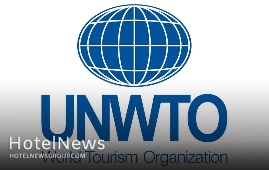
A new report published jointly by WIPO and the World Tourism Organization (UNWTO) on the value of intellectual property in boosting tourism shows how the IP system creates a favorable ecosystem for innovation, entrepreneurship and investment in the sector. The publication, entitled “Boosting Tourism Development through Intellectual Property,” highlights good practices, features case studies and recommendations for policymakers and other tourism stakeholders on how to ensure that creativity, innovation, traditions and cultural heritage in tourism are properly protected and commercialized and that the benefits are shared by all. In a joint Foreword, WIPO Director General Daren Tang and UNWTO Secretary General Zurab Pololikashvili, predict that while the tourism sector has taken a hit during the COVID-19 pandemic, it will recover and “contribute to reigniting hard-hit economies and societies thanks to its capacity to adapt to changes and offer innovative solutions to new challenges.” “In this context, IP rights are powerful tools that can be used to boost tourism development and competitiveness. The IP system is designed to promote creativity and innovation and support efforts by individuals, businesses and other actors to differentiate themselves and their products and services in the marketplace, whether through trademarks, geographical indications, copyrights or patents,” they added. The publication provides practical guidance for non-IP specialists on how to include IP in tourism product development – from destination branding to tourism policies. It shows how different IP rights can be leveraged to raise funds. And it showcases successful experiences and demonstrates how stakeholders around the globe are using IP rights to add value to tourism services and products, as well as to protect and promote local knowledge, traditions and cultural heritage. Through examples of producing cheese, tea, pepper, wine or other products, the publication shows how geographical indications and appellations of origin can be used to support the growth of rural tourism and provide benefits to local communities. To leverage the full potential of the IP system, the report recommends inclusion of IP strategies in national tourism plans and tourism policy strategy for regional and local destinations. Not only does good IP knowledge and management help to make use of the protected intangibles, but it also attracts investments and leverages fundraising opportunities. Finally, tourism authorities are encouraged to raise awareness among tourism and destinations stakeholders on the importance of appropriate IP knowledge and management to foster the sector’s growth in these challenging times.
Create: May 8, 2021 Edit: May 8, 2021 International News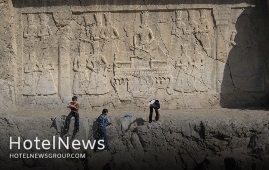
A team of cultural heritage experts has cleaned the well-known 19th-century bas-relief, which is carved on a rock face in Cheshmeh-Ali, southern Tehran. A restoration operation has been completed on the Qajar-era relief of Cheshmeh Ali, which had recently been damaged in an act of vandalism by an individual (or individuals), throwing hair dye and chemicals at the artwork, IRNA reported on Wednesday. The historical, cultural, and recreational site of Cheshmeh-Ali, literally meaning Spring of Ali, embraces an underground mineral stream that pours into an open-air pool that has long been a destination for sightseers and a recreational center for the locals. During the summertime, the site is occupied by hundreds of locals who came for swimming and having fun. Cheshmeh-Ali is in the neighborhood of the ancient Ebn-e Babveyh cemetery, the 12th-century Tughrul Tower, the historical Rashkan Castle, and next to the aged Rey Castle. Another attraction of the site is a 19th-century rock-carved relief that overlooks the pool. The artwork was commissioned by the Qajar king Fath Ali Shah who reigned from 1797 to 1834. Cheshmeh Ali also contains an archaeological site estimated to date from the 4 millennium BC. Rey was one of the capital cities of the Parthian empire (3rd century BC–3rd century CE) and it was captured by the Muslim Arabs in 641 CE. During the reign of the Muslim caliph al-Mahdi in the 8th century, the city grew in importance until it was rivaled in western Asia only by Damascus and Baghdad.
Create: May 1, 2021 Edit: May 1, 2021 Regional News
